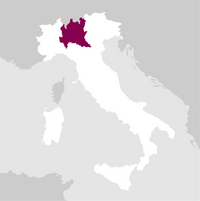Detalles

Perfume

Color
Servir a:
14 -16 °C.
Longevidad:
5 - 10 años
Tiempo de decantación:
1 hora

Maridajes
Carne
Quesos
Cerdo
Productor
Monsupello
De esta bodega
- Año de inicio: 1893
- Enólogo: Stefano Torre, Federico Fermini
- Botellas producidas: 320.000
- Hectáreas: 50
Érase una vez, y todavía es. Corría el año 1893 cuando la familia Boatti, del municipio de Oliva Gessi, en el corazón del Oltrepò Pavese, escribió la página más bella e importante de la historia del vino espumoso italiano: en Cà del Tava, uno de los grandes crus de la bodega, se selló la unión entre Monsupello, Pinot Noir y Chardonnay. Atreverse a lo nuevo, soñarlo, imaginarlo y realizarlo: en nombre de su padre, Carlo Boatti, y hoy con sus hijos Pierangelo y Laura. Con sensibilidades y actitudes diferentes, son intérpretes de horizontes futuros, en la contemporaneidad de sus vinos espumosos.
Leer más


| Nombre | Monsupello Pinot Nero Junior 2024 |
|---|---|
| Tipo | Tinto tranquilo |
| Denominación | Provincia di Pavia IGT |
| Añada | 2024 |
| Tamaño | 0,75 l |
| Grado alcohólico | 13.5% por volumen |
| Variedades de uva | 100% Pinot Nero |
| País | Italia |
| Región | Lombardía |
| Proveedor | Monsupello |
| Origen | Prima Fascia Collinare en los municipios de Torricella Verzate y Oliva Gessi |
| Clima | Exposición: suroeste. |
| Composición del suelo | Arcilloso-calcáreo. |
| Sistema de cultivo | Guyot |
| Plantas por hectárea | 5000 |
| Rendimiento por hectárea | 70 q. |
| Cosecha | Mediados de septiembre |
| Técnica de elaboración | La poda en seco Guyot se realiza desde finales de noviembre, manteniendo un número de 7-8 yemas por cepa. A partir de mayo, se eliminan los brotes superfluos y se atan los brotes principales; se trata de operaciones básicas para mantener un buen equilibrio vegetativo y productivo de la planta, especialmente en el caso de las vides jóvenes. A principios y finales de agosto, tras el envero, se realizan dos aclareos de uva para repartir mejor la producción de la vid entre los sarmientos más próximos al tocón y evitar los racimos (principal causa de ataque del moho gris en años húmedos); el aclareo de los racimos, que favorece una mejor maduración de la uva, permite una mayor concentración de azúcar y sustancias fenólicas y un producto más sano. Desde hace más de 15 años practicamos el pasto en los viñedos para crear una relación cepa-raíz más equilibrada y salvaguardar los insectos útiles para el viñedo; por la misma razón, se utilizan pesticidas de bajo impacto ambiental y se evita el uso de herbicidas químicos. La vendimia se realiza a mano, en cajas de 18 kg. |
| Vinificación | La vinificación comienza con el despalillado, seguido, tras un período de premaceración en frío de una semana, por una fermentación alcohólica que dura unos 12 días. |
| Crianza | Tras el trasiego, se extrae el vino con cuerpo y, después de tres trasiegos, se someterá a afinamiento y a fermentación maloláctica completa en depósitos de acero. A continuación, se embotellará tras una ligera estabilización y microfiltración. |
| Acidez total | 5.8 gr/L |
| PH | 3.58 |
| Azúcar residual | 5.0 gr/L |
| Extracto seco | 26.0 gr/L |
| Alérgenos | Contiene sulfitos |




